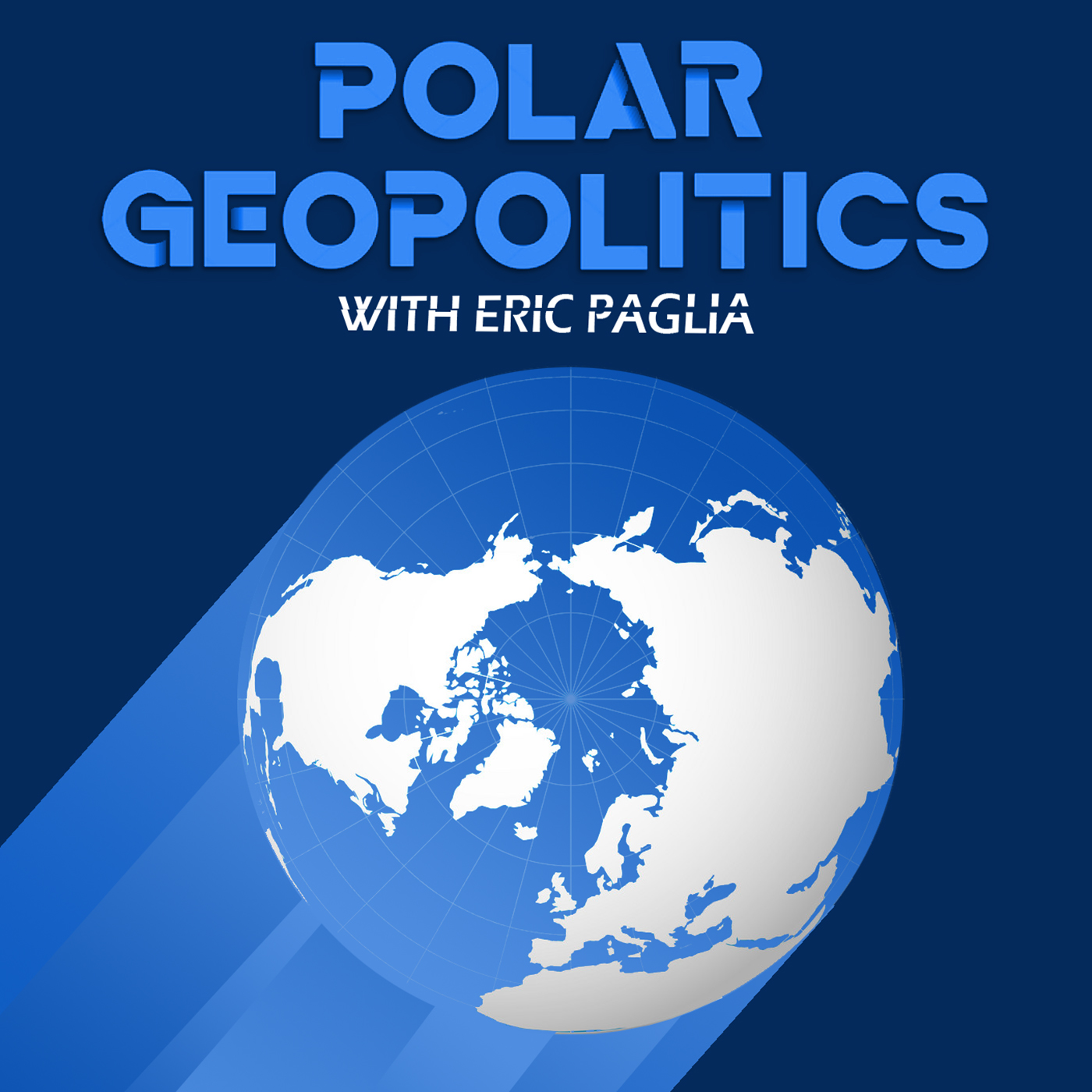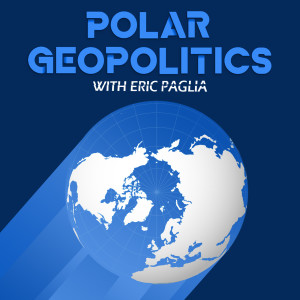
A podcast on the Arctic and Antarctica that applies the lens of geopolitics to analyze a wide range of critical issues pertaining to the polar regions and international affairs. In interviews with leading experts, recurring topics include Greenland, the Arctic Council, climate change, critical raw materials, the Antarctic Treaty System, hybrid warfare, science diplomacy, great power competition between the United States, China and Russia, sustainable development, Svalbard, NATO, Arctic shipping, Alaska, AI, technology and critical infrastructure, the Baltic Sea, military and national security, energy, the role of indigenous peoples in Arctic governance, and more. Polar Geopolitics is hosted by Dr. Eric Paglia, a podcast producer and environmental historian at KTH Royal Institute of Technology in Stockholm, Sweden.
A podcast on the Arctic and Antarctica that applies the lens of geopolitics to analyze a wide range of critical issues pertaining to the polar regions and international affairs. In interviews with leading experts, recurring topics include Greenland, the Arctic Council, climate change, critical raw materials, the Antarctic Treaty System, hybrid warfare, science diplomacy, great power competition between the United States, China and Russia, sustainable development, Svalbard, NATO, Arctic shipping, Alaska, AI, technology and critical infrastructure, the Baltic Sea, military and national security, energy, the role of indigenous peoples in Arctic governance, and more. Polar Geopolitics is hosted by Dr. Eric Paglia, a podcast producer and environmental historian at KTH Royal Institute of Technology in Stockholm, Sweden.
Episodes

Monday Feb 22, 2021
Monday Feb 22, 2021
Dr. Mike Sfraga, director of the Polar Institute at the Wilson Center in Washington D.C., joins the podcast to discuss the various ways he sees the Biden administration altering American policies and geopolitical positioning in the polar regions. From global issues like climate change and great power competition, to regional and local issues such as renewed U.S. engagement with the Arctic Council, the key role of Greenland, and infrastructural development in his home state of Alaska, Dr. Sfraga analyses how American interests in the Arctic and Antarctic may be pursued over the next four years.

Wednesday Dec 23, 2020
Wednesday Dec 23, 2020
The rise of great power competition in the Arctic, the disruption of Antarctic governance due to COVID-19, and the impact of the coronavirus on vulnerable Arctic communities were some of the notable polar topics covered on this podcast during the course of the pandemic year of 2020. In this year-end review, Klaus Dodds, professor of geopolitics at Royal Holloway University, discusses what he sees as some of the most significant geopolitical aspects of the pandemic in the polar regions and beyond during this extraordinary year in world history.

Monday Dec 21, 2020
Monday Dec 21, 2020
Science is to a large extent the currency of governance and geopolitics in Antarctica, giving countries that conduct scientific research there a seat at the Antarctic Treaty System table. But should countries—often from the global South—that bear the brunt of the effects of climate-induced geophysical changes in Antarctica be given a greater voice in the ATS, even if they lack the resources to conduct costly research in the southern high latitudes? Similarly, should the influence of ATS states somehow be related to their level of carbon dioxide emissions, which drive the melting of the Antarctic ice sheet? Peder Roberts, associate professor at the University of Stavanger, joins the podcast to reflect on how countries could be incentivized to reduce their impact on Antarctica while continuing to pursue ambitious polar science programs.

Thursday Oct 08, 2020
Thursday Oct 08, 2020
China’s increasingly ambitious polar activities have to date largely centered on exerting physical presence in the Arctic and Antarctic, according to Dr. Nengye Liu, an associate professor of international law at Macquarie University in Sydney, Australia. In a recent online presentation for China’s polar elite, Dr. Liu recommended that China should abandon such 19th century thinking, which causes anxiety among other stakeholders, and instead embrace a future in which China plays a leading role in combating global environmental change. In this episode of the podcast, Dr. Liu discusses his theoretical framework that could, he asserts, underpin a potential Chinese polar strategy 2.0 to replace current policies for the polar regions.

Tuesday Sep 08, 2020
Tuesday Sep 08, 2020
The admission of China, India, Japan, Singapore and South Korea as observers to the Arctic Council in 2013 seemed a turning point in contemporary Arctic history, with the rapidly increasing engagement of Asian states appearing to signal the arrival of globalization as well as a new era of geopolitics in the High North. But how has it so far played out on the ground and on the ice? To analyze the evolving strategies and activities of the five Asian observer states over the past seven years, Polar Geopolitics is joined by Dr. Mia Bennett, associate professor at the University of Hong Kong and founder of the Cryopolitics blog. Dr. Bennett is an expert on Asian activity in the Arctic, and is a co-author of the newly-published edited volume “Observing the Arctic: Asia in the Arctic Council and Beyond” (Edward Elgar, 2020).

Friday Jul 03, 2020
Friday Jul 03, 2020
The opening of a US Consulate in Nuuk, Greenland represents the latest in a series of moves that signal a deepening geopolitical engagement in the Arctic by the United States in response to Russian and Chinese advances in the region. To explain the current U.S. policy and strategic outlook on the Arctic, including an in-depth discussion on Greenland, this episode of the podcast features an interview with one of the top American officials on Arctic issues: Michael J. Murphy, Deputy Assistant Secretary for Nordic, Baltic, and Arctic Security Affairs at the Bureau of European and Eurasian Affairs at the United States Department of State.

Sunday Jun 07, 2020
Governance disrupted: Pandemic impacts on Antarctica
Sunday Jun 07, 2020
Sunday Jun 07, 2020
Although Antarctica is the only continent without a case of COVID-19, the pandemic has already caused a great deal of disruption to the ATS governance regime, as well as to scientific research and the tourism industry. Some even foresee a shift in Antarctic geopolitics as a result of the coronavirus crisis. To analyze the range of potential impacts of COVID-19 on Antarctica in the short, medium and long term, this episode of Polar Geopolitics features Associate Professor Alan Hemmings, an expert on Antarctic governance and geopolitics at the Gateway Antarctica Centre for Antarctic Studies and Research at the University of Canterbury in Christchurch, New Zealand.

Monday May 18, 2020
Monday May 18, 2020
Russian and Norwegian interests intersect and occasionally collide in the Barents Sea and Svalbard, an Arctic geopolitical hotspot where lucrative fisheries, extensive energy resources and strategic nuclear forces exist in relatively close proximity. To analyze why simmering tensions between Norway and Russia in the Barents-Svalbard region have once again risen to the surface, Polar Geopolitics is joined by Dr. Andreas Østhagen, a senior research fellow at the Fridtjof Nansen Institute and an expert on Arctic geopolitics and the Barents Sea.
